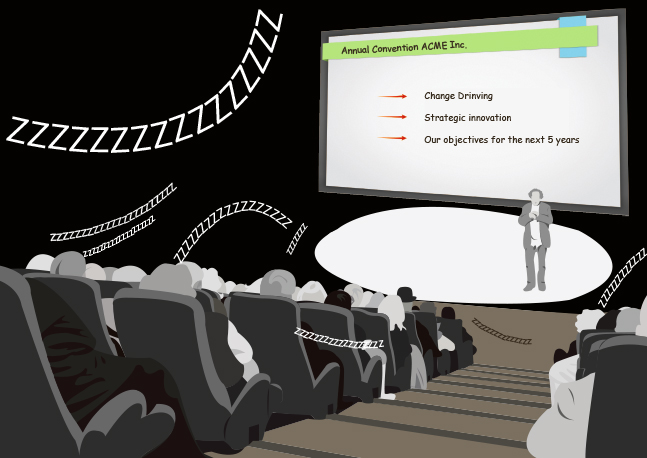We go there reluctantly. After 10 minutes, we are already asking ourselves what it is we are doing here. Oh yes, the top-management requested our presence. Or “strongly insisted” we be there. Oh, a PowerPoint. Oh… Too many figures, too many signs and arrows going in every direction, not enough energy from the lecturer. Who is it by the way? We’ve never seen him before… Oh, maybe we did bumped into him in the corridors… Anyway. Let’s check our e-mails. Vrrr, vrrr, vrrr. Gosh, how many are there? Too many. Well, just one thing left to do: discreetly take a small nap.
The baby on the doorstep.
The seminar. The art of wasting everybody’s time? Or the firm’s money? The art of throwing everyone’s ego in a fight doomed from the beginning, and finally making everyone agree on its uselessness?
Corporate seminars have not always been the target for such mockery. And rightfully so. It used to carry out and put in motion many important tasks. Professional goals as well as a social and relational objectives (team cohesion, new synergies, troops’ motivation, and promotion of the company’s culture…).
Today, they seem to achieve the exact opposite.
Some think it’s too long, others think it’s unproductive, most believe it’s simply useless, the seminar has become a chore arriving like a baby on the doorstep of everyone’s schedule.
A secret hard to keep.
Functioning according to a vertical hierarchical structure, it generates boredom and lack of interest. Unable to formulate concrete results and leading the way to well-defined tasks, it generates scepticism and cynicism. Trying by every mean possible to make a team out of individuals, departments out of teams, and a company out of departments, it generates distrust and distancing.
Is it doomed to remain exactly that, a useless hypocrisy, secretly shared but never admitted?
Maybe not as secret as one might think though.
While leaving for Prague one day, I ran at the airport into a group of people who looked both professional with a small note of forced casualness. Their eyes seemed to say I-don’t-know-what-the-hell-I-am-doing-here-with-these-people-and-what-I-will-find-to-tell-them-for-3-days. I silently laughed thinking they were probably colleagues going on some sort of team-building trip in Prague for a week-end. Well, turned out I overheard a conversation which confirmed exactly that.
“Go along honey, go play with the little children!”
To this highly critical mind-set, executives responded by proposing “green” or exotic places for the seminars, funny activities and “smiling-workshops”, programs always more exciting and extravagant.
Well, it’s a start, and demonstrates a will to adapt. But it heightens the risk of making it simply a “gadget-seminar”, which is simply the offset of a failed-seminar. Executives act like old grandmas who, unwilling or unable to see that their grandchildren are growing up, constantly organize educative little games to keep them occupied, or shove them off to play with the other kids in the sandbox.
Grandmas are important, one shouldn’t cast them off. But do tell them you do not need Playmobil anymore to prepare the attack plan of your knights… hum, employees!
One must adapt the methods and tools of the seminar without losing sight of its core objective. Turn into collaboration what was one-sided; into efficiency what was unclear; into fun what was too serious, without making it a complete farce. Involve participants on a long-term basis.
Illustration by Sophie Martineau.
